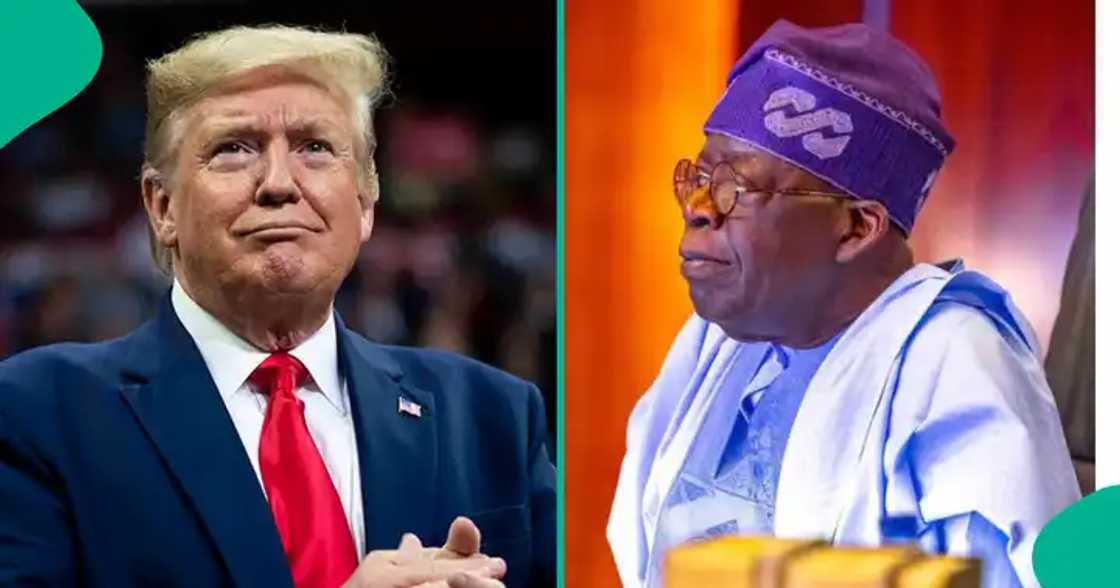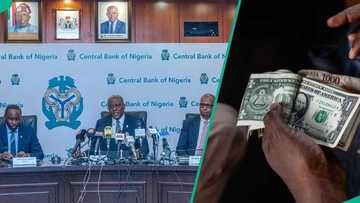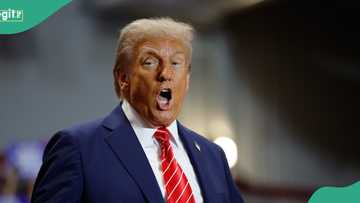Trump’s Military Threat Could Crash Investor Confidence, Worsen Naira, CPPE warns
- The Centre for Promotion of Private Enterprise (CPPE) has warned of severe economic consequences following President Trump’s threat to Nigeria
- The CPPE warned that move could spark investor panic, financial market volatility, and destroy Nigeria’s reputation
- Muda Yusuf, CPPE’s Director and CEO, said Trump’s statement magnifies its potential impact on the Nigerian economy
Pascal Oparada is a journalist with Legit.ng, covering technology, energy, stocks, investment, and the economy for over a decade.
The Centre for the Promotion of Private Enterprise (CPPE) has raised alarm over the potential economic repercussions of the recent military threat issued by the U.S. President Donald Trump against Nigeria.
In a new policy brief titled “Potential Economic Implications of the U.S. Threat of Military Action on Nigeria,” CPPE warned that the development could trigger widespread investor panic, financial market volatility, and damage Nigeria’s reputation as a safe investment destination.

Source: Facebook
According to the report signed by Dr. Muda Yusuf, CPPE’s Director and Chief Executive Officer, “Although the statement appears to have been made on the basis of incomplete intelligence and misjudged assumptions, its source, the President of the United States — magnifies its potential impact.”
Investor confidence at risk
Trump, through his Truth Social platform on October 31, 2025, labeled Nigeria as a “country of particular concern” and instructed the U.S. Department of War to prepare for “possible action” if killings in Nigeria continued.
The CPPE noted that even if such rhetoric is based on false premises, it has already sparked diplomatic unease and market uncertainty.
“Regardless of its inaccuracy, the pronouncement risks undermining Nigeria’s image as a stable investment destination,” the brief stated.
The group further warned that investor anxiety could result in capital flight, reduced foreign direct investment (FDI), declining venture capital interest, and falling stock valuations.
The perceived threat, it added, “has inflicted significant reputational damage” that could linger even if tensions ease.
Economic indicators under threat
According to the CPPE, the likely economic consequences of Trump’s remarks include:
- Naira depreciation due to portfolio reversals and capital outflows.
- Rising sovereign bond yields as investors demand higher risk premiums.
- Increased inflationary pressure driven by weakened currency and tighter financial conditions.
- Falling foreign reserves and reduced external buffers, which may strain fiscal stability.
The policy brief warned that heightened geopolitical risk could lead to higher interest rates, deteriorating investor sentiment, and greater pressure on Nigeria’s macroeconomic fundamentals.
Call for diplomatic and policy response
To mitigate these risks, the CPPE advised the Nigerian government to take immediate diplomatic steps to clarify facts and restore confidence.
Dr. Yusuf urged President Bola Tinubu’s administration to engage Washington at high diplomatic levels, deepen intelligence cooperation, and communicate clearly to reassure domestic and foreign investors of Nigeria’s economic and political stability.
“The government must project transparency, strengthen governance, and maintain macroeconomic discipline to reinforce resilience against external shocks,” the brief stated.
Tinubu responds, defends Nigeria’s image
Reacting to Trump’s statement, President Tinubu dismissed the U.S. President’s claims as “unfounded and misleading.” In a statement on Sunday, Tinubu insisted that Nigeria remains a country committed to religious freedom and tolerance.
“Since 2023, our administration has maintained active engagement with both Christian and Muslim leaders,” Tinubu said. “The characterisation of Nigeria as religiously intolerant does not reflect our national reality.”
Conclusion: Diplomacy over coercion
The CPPE concluded by warning that any form of U.S. military intervention would destabilise Nigeria’s economy and threaten regional peace. “Unilateral military action would aggravate humanitarian conditions,” it said.
The think tank urged both nations to pursue diplomacy, partnership, and mutual respect for sovereignty as the only viable path forward to safeguard peace and economic stability.

Source: Twitter
Economic implications of being Country of particular concern
Legit.ng earlier reported that on Friday, October 31, 2025, U.S. President Donald Trump officially redesignated Nigeria as a Country of Particular Concern (CPC) over alleged killings of Christians in the northern part of the country.
Experts warned that the U.S. decision could trigger serious economic consequences for Nigeria, particularly if Washington decides to impose sanctions or trade restrictions.
According to trade data, the U.S. recorded a $576 million trade surplus with Nigeria in the first half of 2025, a sharp turnaround from a $779 million deficit in the same period of 2024.
Source: Legit.ng





